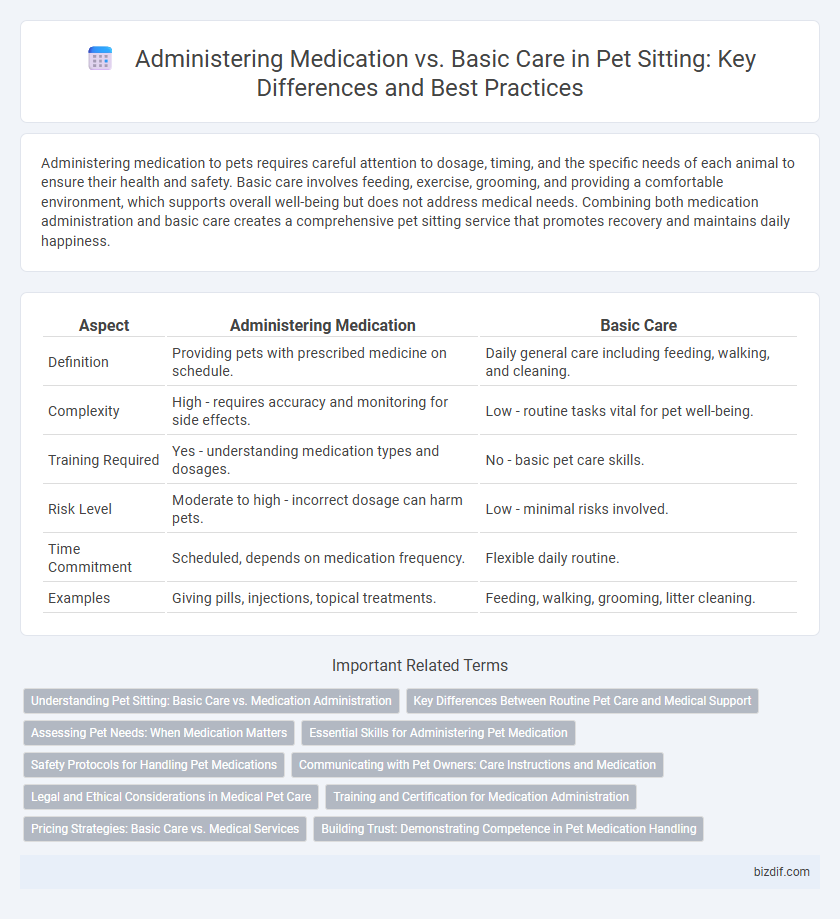Administering medication to pets requires careful attention to dosage, timing, and the specific needs of each animal to ensure their health and safety. Basic care involves feeding, exercise, grooming, and providing a comfortable environment, which supports overall well-being but does not address medical needs. Combining both medication administration and basic care creates a comprehensive pet sitting service that promotes recovery and maintains daily happiness.
Table of Comparison
| Aspect | Administering Medication | Basic Care |
|---|---|---|
| Definition | Providing pets with prescribed medicine on schedule. | Daily general care including feeding, walking, and cleaning. |
| Complexity | High - requires accuracy and monitoring for side effects. | Low - routine tasks vital for pet well-being. |
| Training Required | Yes - understanding medication types and dosages. | No - basic pet care skills. |
| Risk Level | Moderate to high - incorrect dosage can harm pets. | Low - minimal risks involved. |
| Time Commitment | Scheduled, depends on medication frequency. | Flexible daily routine. |
| Examples | Giving pills, injections, topical treatments. | Feeding, walking, grooming, litter cleaning. |
Understanding Pet Sitting: Basic Care vs. Medication Administration
Pet sitting encompasses both basic care tasks, such as feeding, walking, and companionship, and specialized duties like administering medication, which requires precise attention to dosage and timing. Understanding the distinction between these responsibilities is crucial for pet sitters to ensure they meet the pet owner's expectations and the animal's health needs. Proper training in medication administration enhances safety and reliability, differentiating basic pet sitting services from more comprehensive care options.
Key Differences Between Routine Pet Care and Medical Support
Routine pet care includes feeding, grooming, exercise, and monitoring behavior, ensuring overall well-being without specialized knowledge. Administering medication requires precise dosing, understanding of drug interactions, and vigilance for side effects, involving a higher level of skill and responsibility. Medical support often necessitates collaboration with veterinarians to manage chronic illnesses or post-surgical recovery, distinguishing it sharply from basic care tasks.
Assessing Pet Needs: When Medication Matters
Administering medication requires careful assessment of a pet's specific health condition, dosage instructions, and potential side effects to ensure safety and effectiveness. Basic care focuses on routine needs such as feeding, grooming, and exercise, which maintain general well-being but do not address underlying medical issues. Accurate evaluation of when medication is essential distinguishes professional pet sitting services from simple care providers, highlighting the importance of specialized knowledge in pet health management.
Essential Skills for Administering Pet Medication
Administering pet medication requires precision in dosage measurement, timing, and understanding of the specific drug's effects compared to basic care tasks like feeding or grooming. Essential skills include proper restraint techniques, accurate tracking of medication schedules, and recognizing adverse reactions to ensure pet safety. Mastery of these skills differentiates routine care from effective medical administration in pet sitting services.
Safety Protocols for Handling Pet Medications
Administering medication in pet sitting requires strict adherence to safety protocols, including accurate dosage measurement, proper storage away from other pet supplies, and clear labeling to prevent mix-ups. Basic care involves routine activities like feeding and grooming but does not include handling prescription drugs or injections. Ensuring pet sitter training on medication administration and maintaining detailed logs enhances the safety and well-being of pets under care.
Communicating with Pet Owners: Care Instructions and Medication
Effectively communicating medication instructions ensures pet owners understand dosage, timing, and potential side effects, which prevents dosing errors and promotes pet safety. Clear explanation of basic care routines alongside medication details builds trust and supports consistent pet health management. Providing written care instructions reinforces verbal communication, allowing pet owners to reference vital information during the pet sitting period.
Legal and Ethical Considerations in Medical Pet Care
Administering medication to pets requires strict adherence to legal regulations and veterinary prescriptions to ensure safety and prevent malpractice. Basic care involves routine activities like feeding and grooming, which carry fewer legal risks but still demand ethical responsibility for animal welfare. Pet sitters must obtain explicit consent and follow professional guidelines when providing medical care to protect themselves and the animals.
Training and Certification for Medication Administration
Administering medication requires specialized training and certification beyond basic pet sitting care to ensure accurate dosing and proper handling of various medicines. Certified pet sitters receive instruction on identifying side effects, managing injection techniques, and understanding medication schedules tailored to each pet's health needs. Basic care focuses on feeding, exercise, and companionship, while medication administration demands adherence to strict protocols guided by veterinary recommendations.
Pricing Strategies: Basic Care vs. Medical Services
Pricing strategies for pet sitting vary significantly between basic care and administering medication services, with medical services typically commanding higher rates due to increased responsibility and expertise. Basic care pricing generally covers feeding, walking, and companionship, often structured as a flat rate or hourly fee, whereas medication administration involves precise dosing, handling special instructions, and potential emergency readiness, justifying premium pricing. Pet sitters must analyze local market demand, competitor rates, and the complexity of medical tasks to effectively balance affordability with service quality in their pricing models.
Building Trust: Demonstrating Competence in Pet Medication Handling
Administering medication requires precise knowledge of dosages, timings, and potential side effects, showcasing a higher level of competence than basic care tasks like feeding or walking. Demonstrating accurate medication handling builds trust with pet owners who rely on sitters to manage their pets' health responsibly and confidently. Mastery in this specialized area distinguishes professional pet sitters and reassures clients about their pets' well-being during their absence.
Administering medication vs Basic care Infographic

 bizdif.com
bizdif.com